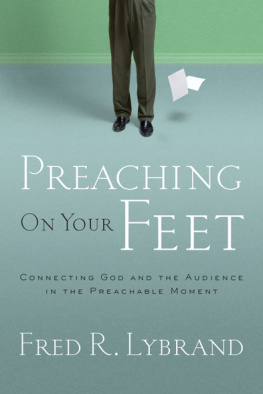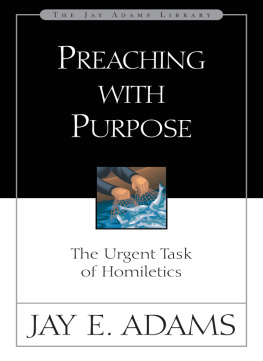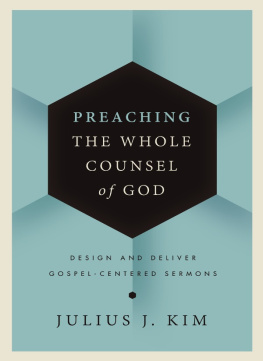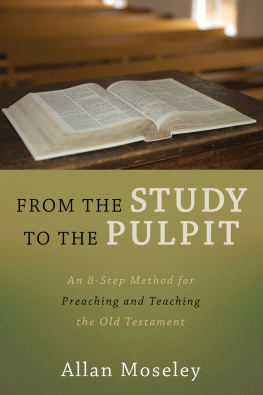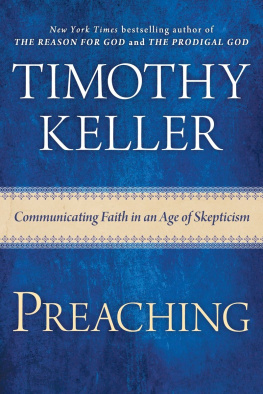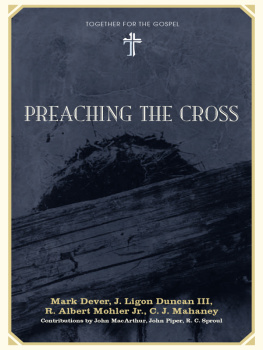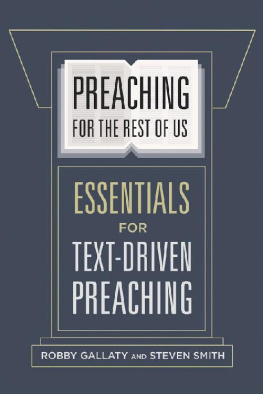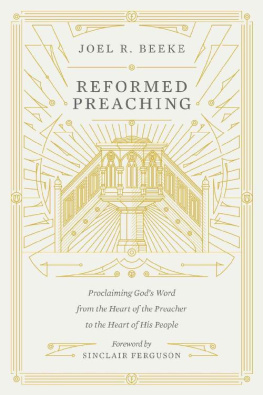

Preface
I hope you'll read this preface and not skip it as I do most books. It strikes me that I should tell you, the reader, who exactly I had in mind as I wrote this book. Knowing this audience up front may explain some of my comments, and it also may help you decide if you match the heart of my hope. In my mind I'm thinking about a new preacher who is fresh out of seminary or who has recently received a call to ministry and has in his heart the hope of touching the world through the proclamation of the Word of God. It's a stage of excitement and dreams and idealshigh goals for how explaining the Word of God with passion can catch fire in the souls of those who hear. I'm thinking of that young person or new person in the ministry who sees preaching the Word of God as an awesome responsibility with eternal impact.
The second person in my mind is an older preacher, one who has been at the work long enough to know the realities of study, the realities of audiences, and the realities of what people will learn and won't learn. This second individual is not without hopes and not without interest in the purposes of God; he still labors and is confident that hearing well done is well worth the work. This second individual, however, is like someone who is beginning to catch a virus; somewhere in his body he can tell something's wrong, not quite noticeable, unclear exactly what it is; and yet there remains a sense that things are not quite right. He's been to seminars, he's read books, he's tried different things. Even on occasion (perhaps often) he simply purchased and repeated a proven sermon from someone else who's usually famous.
In both cases what is at issue is the more that is out there. I truly believe that in all the opportunities to blame different things for the state of Christianity, which under the circumstances I'm not convinced is as bad as statisticians claim, I think the heart of the issue for vibrancy or shallowness in Christianity is the pulpit. It has been a special characteristic of Christianity, and historically consistent, that strong pulpits lead to strong churches, weak pulpits to weak churches, and the strength of the churches is the strength of Christianity. Even as I write these words, I think of my childhood church which I visited again not too long ago and remain shocked at a twelve-minute sermon which borrows a thought from a passage and tries to illustrate it briefly before moving on in the liturgy. Now of course I'm confident the preacher is good, but the whole denomination has that orientation. My conviction is simply shame on independent churches and denominational churches that have reduced the preaching of the Word of God to short homilies with limited value and an eye toward entertainment. In Spurgeon's words I believe we need soul-moving preachers; and yet to be a soul-moving preacher, mustn't our own souls be moved as preachers?
In these beginning words I also want to explain my qualification for addressing this topic. First, I grew up in the home of an orator. My dad served in the Alabama legislature and received the Birmingham News award for outstanding orator of the state senate in the 1970s. I have been speaking publicly for 35 years and have maintained a consistent pulpit ministry for the last 21. I currently preach to around 700 individuals every Sunday morning over three services. I taught speech communication at the University of Alabama for two years and have a library approaching a hundred volumes in homiletics alone.
It is important to understand, however, that I don't think any of these things qualify me to speak on this topic. The only qualification I offer is that about thirteen years ago I came to a crisis point in ministry; I came close to quitting preaching. If it were not for the lessons I will share in this book, I would not be in ministry today. My qualification is that I have begun to learn to preach on my feet, and as I do so, I find preaching a joy and not a burden. I see God in His kindness use the words I share from His Word to touch lives. I see Him give me back time and energy and hope and a constant readiness to open truth to whomever will listen.
I have in mind this young, new, idealistic preacher and this older, concerned but still hopeful, seasoned preacher that both might embrace the principles of preaching on their feet and see a path to soul-moving preaching open before them. I hope these individuals and countless others might become part of a growing movement of well-studied leaders of God who walk well, walk carefully, fill their souls with truth, and pour it out from the pulpit.
It is difficult to measure the impact of certain leaders and their theologies on Christian history, but Karl Barth certainly ranks among the great ones, at least in the last century, carrying on influence to this very day. It may be that something he expressed in preaching the gospel underscores the problem or the challenges we have today, even as we consider the possibility of preaching a message from our hearts to the hearts of those who listen. Read his words:
There are a number of rules which should be observed in composing a sermon. First, a sermon should be written; this is so important that it is necessary to give reasons for it. Certainly the preacher will be giving an address, but whether or not he has the necessary capacity for doing so, he should not simply wait for the Holy Spirit, or any other spirit, to inspire him at the moment of speaking. A sermon must be prepared and drafted word by word. It is certainly true in this instance that an account will have to be given for every idle word. Preaching is not an art in which some are able to improvise while others have to write everything out; it is the central action of evangelical worship in close association with the sacrament. Only a sermon in which every word can be justified may be said to be a sacramental action. The responsibility which attaches to every word he utters is a part of the sanctification of the minister. This rule holds for every preacher and not only for the young. Some ministers have acquired such facility in preaching that they feel able to dispense with this discipline, but their sermons are not Christian discourses.
The influence of this kind of reasoning is difficult to quantify, and yet if a theologian of Barth's stature instructs us never to say a word that was not first written, imagine what happens. If a theologian of Barth's stature tells us never to listen to any spirit in the moment, imagine what is missed in God's work among us. Of course, even to the layman, one can appreciate the fact that there must be a dependence on the Spirit, whether one is crafting words at his desk or sculpting a truth before the eyes of an audience as he pours out his heart for their souls.
The work you have in your hands is a fresh fruit with ancient roots. I think of it as preaching on your feet, but I'm not alone; in 1947 Gerald Kennedy declared, 'Any man can learn to stand on his feet and preach with freedom.' Any man can master this technique providing he's willing to undergo the necessary self-discipline.
_________________________
1Karl Barth, The Preaching of the Gospel, trans. B. E. Hooke (Philadelphia: Westminster, 1963), 77-78.
2John A. Broadus and Vernon L. Stanfield, On the Preparation and Delivery of Sermons, 4th ed. (San Francisco: Harper & Row, 1979), 276; quoted sentence is from Gerald Kennedy, His Word through Preaching (New York: Harper, 1947). 89.
Next page
